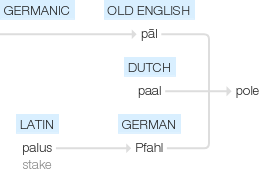Pole
late Old English pāl (in early use without reference to thickness or length), of Germanic origin; related to Dutch paal and German Pfahl, based on Latin palus ‘stake’.
wiktionary
From Middle English pole, pal, from Old English pāl(“a pole, stake, post; a kind of hoe or spade”), from Proto-West Germanic *pāl(“pole”), from Latin pālus(“stake, pale, prop, stay”), perhaps from Old Latin *paxlos, from Proto-Italic *pākslos, ultimately from Proto-Indo-European *peh₂ǵ-(“to nail, fasten”). Doublet of peel, pale, and palus.
From Middle French pole, pôle, from Latin polus, from Ancient Greek πόλος(pólos, “axis of rotation”).
etymonline
Pole (n.)
"inhabitant or native of Poland," 1650s, from German Pole, singular of Polen, from Polish Polanie "Poles," literally "field-dwellers," from pole "field," related to Old Church Slavonic polje "field" (from PIE root *pele- (2) "flat; to spread"). The older word was Polack.
pole (n.1)
"stake, staff," late Old English pal "stake, pole, post," a general Germanic borrowing (Old Frisian and Old Saxon pal "stake," Middle Dutch pael, Dutch paal, Old High German pfal, Old Norse pall) from Latin palus "a stake," from PIE *pakslo-, suffixed form of root *pag- "to fasten." Later specifically "a long, slender, tapering piece of wood."
Racing sense of "inside pole-fence surrounding a course" is from 1851; hence pole position in auto racing (1904). A ten-foot pole as a metaphoric measure of something one would not touch something (or someone) else with is by 1839, American English. The ten-foot pole was a common tool used to set stakes for fences, etc., and the phrase "Can't touch de bottom with a ten foot pole" is in the popular old minstrel show song "Camptown Races."
"I saw her eat."
"No very unnatural occurrence I should think."
"But she ate an onion!"
"Right my boy, right, never marry a woman who would touch an onion with a ten foot pole."
[The Collegian, University of Virginia, June 1839]
pole (n.2)
"northern or southern end of Earth's axis," late 14c., from Old French pole or directly from Latin polus "end of an axis;" also "the sky, the heavens" (a sense sometimes used in English from 16c.), from Greek polos "pivot, axis of a sphere, the sky," from PIE *kwol- "turn round" (PIE *kw- becomes Greek p- before some vowels), from root *kwel- (1) "revolve, move round."
Originally principally in reference to the celestial sphere and the fixed points about which (by the revolution of the Earth) the stars appear to revolve; also sometimes of the terrestrial poles (poles of this world), the two points on the Earth's surface which mark the axis of rotation.
pole (v.)
1570s, "to furnish with poles (for support)," from pole (n.1). Meaning "to push with a pole" is from 1753. Related: Poled; poling.
